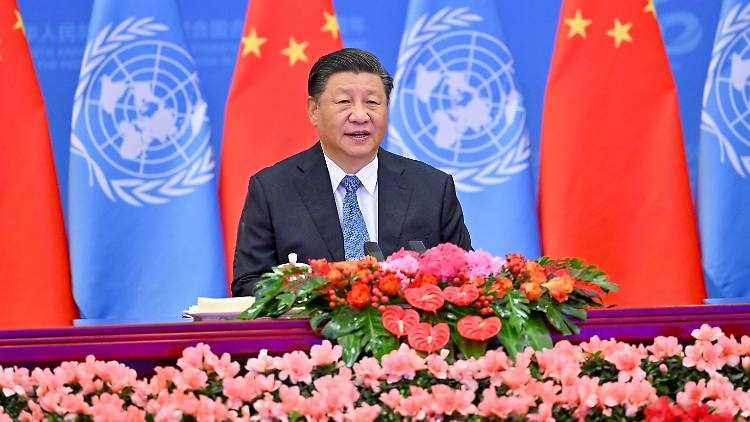Tuesday, November 02, 2021
Person of the Week: Xi Jinping
China is the biggest climate hypocrite
By Wolfram Weimer
China’s president deliberately skipped the UN climate summit. His country is the world’s largest emitter of CO2, 60 percent of its electricity comes from coal-fired power plants. Climate protest is brutally suppressed. As with the Hong Kong and Corona issues, criticism from the world’s public is growing.
Xi Jinping never even came to Glasgow. At the summit of the world climate conference, he should have listened to massive criticism. After all, China is not only by far the world’s largest emitter of CO2 and pollutes the atmosphere more than all other industrialized countries combined. Above all, Beijing is not making a real turnaround. Sixty percent of China’s electricity comes from dirty coal-fired power plants – and it’s not getting any less. According to the Global Energy Monitor, China brought new coal-fired power plants with a capacity of 38.4 gigawatts to the grid in 2020 – that’s three times as much as the rest of the world put together. More than 200 new coal-fired power plants are currently under construction. The Carbon Tracker expert group puts Beijing’s planning project at 368 new power plants. Greenpeace reports that a further 24 new hard coal-fired power plants have been approved in the current year alone.

China’s Prime Minister Xi is committed to climate protection, but more and more coal is being mined in his country.
(Photo: picture alliance / dpa / XinHua)
At the world climate summit, US President Joe Biden complained that Beijing’s climate policy was disappointing. With all the progress made by the international community, one must take note of “what China does not do, what Russia does not do and what Saudi Arabia does not do”. His security advisor Jack Sullivan even speaks of a “startling” failure. China is responsible for the “major outlier” in the fight against global climate change. Numerous environmental groups such as Greenpeace have also sharply criticized China’s energy policy.
China will not say goodbye to coal because the country’s security of supply is already unstable. Most recently, in around 20 parts of the country, the electricity had to be switched off again and again and rationed for certain times – simply because too little was available. The state planning commission has directly requested the coal-rich parts of Inner Mongolia, Shanxi and Shaanxi to increase coal production. For China’s state and party leadership, security of supply clearly has priority over climate protection. In a year’s time, Xi wants to get a third term of office at the 20th party congress and promises prosperity for everyone. Coal should help him with this.
More and more coal
From Beijing’s point of view, there is even an economic competitive advantage if cheap coal-fired power generation – for example for the production of steel and cement – can drive unpleasant competition that has to be converted with expensive alternatives out of the global markets. Beijing is apparently accepting that enormous amounts of climate-damaging CO2 are being released in China.
According to official data from the Beijing government, China will increase its coal production by almost six percent in 2021. It is approaching the value of 4 billion tons. Beijing proudly reports that China is achieving production records. Since the beginning of August, the planning authority has approved the commissioning of 153 previously closed coal mines. They would increase production capacity by 220 million tons per year.
For Xi Jinping, this creates a global image problem. His government is happy to officially emphasize its responsibility for climate policy, and China is staging itself as a green pioneer in matters of e-mobility with all sorts of projects. But if the electricity for this e-mobility comes from dirty coal-fired power plants, the credibility of his policy is ruined. In order to curb global criticism to some extent, China no longer wants to build coal-fired power plants abroad.
Hong Kong, Corona crisis and climate issue
With the climate policy, the government in Beijing is reaping the third headwind in global opinion within a short period of time. Even the suppression of freedom of expression and democracy and Hong Kong caused storms of protest around the world. Then the Chinese leadership came under massive criticism with its corona policy. With restrictions on the freedom of the press (warning doctors were also severely harassed), Beijing first tried to cover up and downplay the outbreak of the pandemic in Wuhan, and ultimately everything was done politically to hinder research into the cause of the outbreak. The suspicion that the pandemic was triggered by a laboratory accident in Wuhan (where bats are being experimented with on coronaviruses) has increased due to this behavior.
In all three cases – Hong Kong, the pandemic or now the climate-coal issue – Xi Jinping’s government is paying close attention to at least suppressing the domestic protests. Criticism of the authorities’ actions has been extensively erased by the regime – for example on the Internet. Critical comments are erased or overwhelmed by state trolls, and censorship rules even in private news chats.
Environmentalists and climate activists are arrested again and again, including the Greta Thunberg of China, the student Howey Ou. The official website of Fridays for Future in China was only online for a few days, then it was blocked. If you even mention terms like “climate crisis” or “FridaysforFuture” on social media in China, you will be immediately captured and targeted by the state authorities. The environmentalist Fu Xiancai, who gave an interview to ARD, was brutally beaten by “members of a thug brigade”, according to the human rights organization Human Rights in China. The official letter from Xi Jinping to the World Climate Conference sounds almost cynical. There it says: “Actions are the only way to turn visions into reality.”
